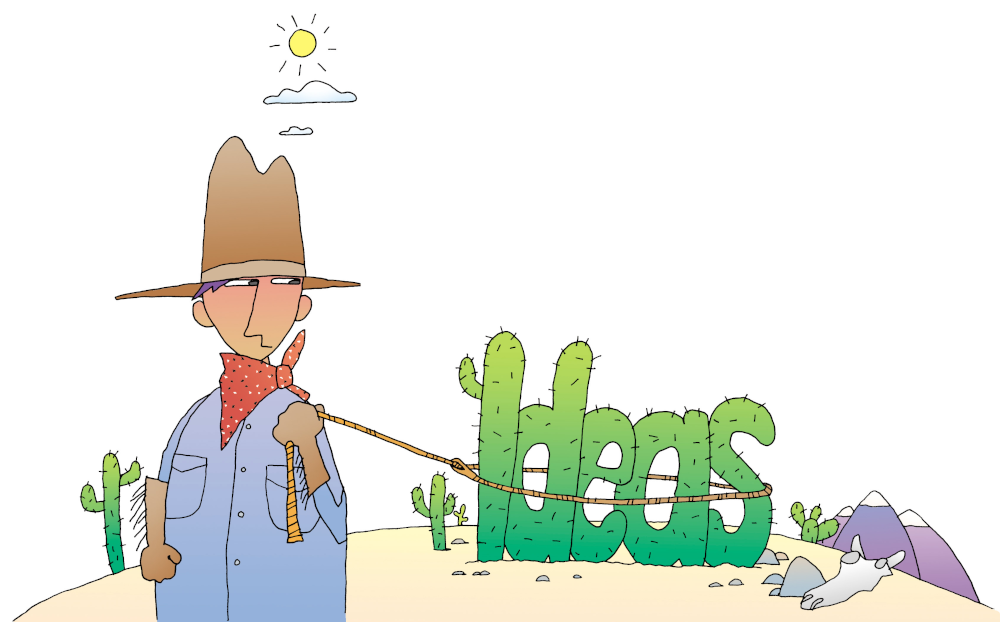Page 75

Writing Basic Sentences
Ideas have free range in your brain, but you need to round them up if you want to write them down. You can lasso ideas with strong sentences.
To be strong, a sentence needs a subject and a verb and a complete thought. If a group of words is missing one of those parts, it’s a fragment. It’s like a lasso without a loop in it.
This chapter will help you write strong, complete sentences that can tame even the wildest ideas.
What’s Ahead
WE 076
Page 76
Sentence Review
Sentences are the freight trains that carry your ideas to the reader. As a result, you should understand how these trains of thought are put together.
The Basic Parts of a Sentence
Sentences have two basic parts—the subject and the verb.
Subject 🟪 The subject usually tells who or what is doing something.
Sara rides her bike to Tanisha’s house.
Verb 🟪 The verb (also called the predicate) expresses action or links the subject to another part of the sentence.
Tanisha takes her own bike from the garage. (action verb)
The girls are eager for today’s adventure. (linking verb)
Additional Words 🟪 Most sentences also contain additional words that describe or complete the thought.
The girls are eager for today’s adventure.
Compound Subjects and Verbs 🟪 A sentence may include more than one subject or more than one verb.
Tanisha and Sara ride to the park. (two subjects)
They swing and slide. (two verbs)
Compound Sentence 🟪 Two sentences may be connected with a conjunction (and, but, or, nor, for, so, yet).
Sara loves the monkey bars, but Tanisha prefers the seesaw.
Complex Sentence 🟪 An independent clause (complete sentence) connects to one or more dependent clauses.
When the day gets late, the girls ride their bikes home.
Sara rides her bike to Tanisha’s house.
Tanisha takes her own bike from the garage. (action verb)
The girls are eager for today’s adventure. (linking verb)
The girls are eager for today’s adventure.
Tanisha and Sara ride to the park. (two subjects)
They swing and slide. (two verbs)
Sara loves the monkey bars, but Tanisha prefers the seesaw.
When the day gets late, the girls ride their bikes home.
WE 077
Page 77
What Can Sentences Do?
Not all sentences function in the same way. Different types of sentences serve different purposes. Sentences do the following:
Make Statements 🟪 A statement gives information about a person, a place, a thing, or an idea. It usually starts with a subject followed by a verb.
The robin built a nest in the maple tree.
Ask Questions 🟪 A question asks for information. It often starts with the verb and includes the subject later.
Will the robin lay eggs soon?
Give Commands 🟪 A command tells people just what to do. It often starts with a verb and has an implied subject (You).
(You) Leave the nest alone.
Make Requests 🟪 A request gives directions or tells how to do something. It also starts with a verb and has an implied subject (You).
(You) Take a picture of the nest.
Express Emotions 🟪 An exclamation expresses strong emotion or surprise.
It has blue eggs!
You can find out more about sentences in the “Understanding Sentences” section. (See pages 466–470.)
WE 078
Page 78
Sentence Errors
Sentence Fragment 🟪 A sentence fragment is a group of words that looks like a sentence but does not express a complete thought.
Incorrect
Has two pet cats. (The subject of the sentence is missing.)
Correct
My family has two pet cats.
Incorrect
In the sunny window seat all day. (The subject and verb are both missing.)
Correct:
They sleep in the sunny window seat all day.
Run-On Sentence 🟪 A run-on sentence happens when two sentences are joined without punctuation or a connecting word.
Incorrect
I love fall colors raking leaves is not my favorite.
Correct
I love fall colors. Raking leaves is not my favorite.
(A period has been added, and a word has been capitalized.)
Correct
I love fall colors, but raking leaves is not my favorite.
(A comma and the conjunction but have been added.)
Rambling Sentence 🟪 A rambling sentence occurs when you put too many short sentences together with the word and.
Incorrect
My friend Wade and I walk home together and we stop at Central Park and do “acting parts” on the WWII tank and I play a superhero and Wade plays a supervillain.
(Too many and’s are used.)
Correct
My friend Wade and I walk home together. We stop at Central Park and do “acting parts” on the WWII tank. I play a superhero, and Wade plays a supervillain.
WE 079
Page 79
Sentence Agreement
Make sure that the subjects and verbs in your sentences agree with each other. If you use a singular subject, use a singular verb; if you use a plural subject, use a plural verb.